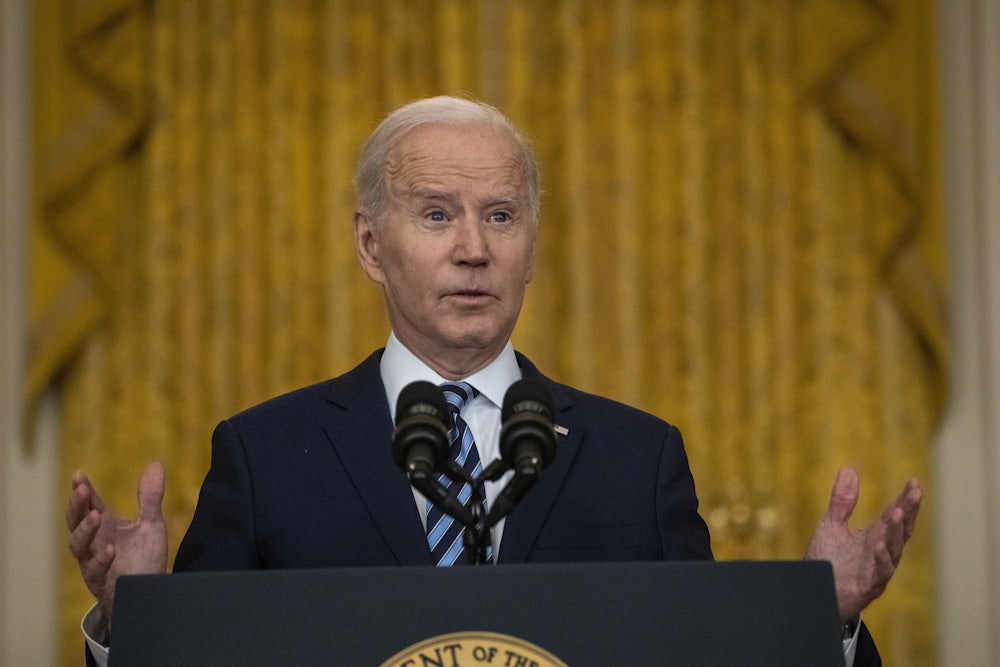In normal times, the State of the Union in an even-numbered year offers an obvious time to assess the political prospects of the president and his party. And by conventional standards, the outlook for Joe Biden and the Democrats is bleak. If you read the latest pundit roundup, the Democrats have about as much chance of holding Congress in 2022 as a homemade iPhone video filmed with a thumb over the lens has of winning the Academy Award for best picture.
Consider these daunting numbers:
- Biden’s approval rating (just 40 percent) has hit the lowest ebb of his presidency, according to the rolling assessment at FiveThirtyEight, a gold-standard statistical website.
- Going back to 1950, as election analyst Nathan Gonzales points out in Roll Call, no president has ever risen significantly in the polls between midwinter and the November of an off-year election.
- A new NPR/PBS/Marist poll found that 56 percent of all voters (including 15 percent of Democrats) considered Biden’s first year in office to be a failure. And in a Quinnipiac survey, 29 percent of Democrats and 62 percent of independents believe that Biden has not kept his campaign promises.
- The president’s party has lost an average of 26 House seats and four Senate seats in off-year elections since World War II. The Democrats, by the way, have just four votes to spare in the House and none in the Senate.
- A significant margin of registered voters say they plan to vote for a Republican (49 percent) rather than a Democrat candidate (42 percent) for Congress, according to a new Washington Post/ABC News poll.
- In virtually every poll—and precise results vary because of question wording—more than two-thirds of Americans believe the country is heading in the wrong direction.
Whew.
Arguing against the evidence for a GOP wave election seems akin to writing a halftime speech for the coach of a Saturday YMCA pickup basketball team suddenly transported into the NCAA tournament.
Yet an argument can be made that it is jumping the gun—and perhaps even wrong—to consign the Democrats to political disaster more than eight months before the off-year elections. I am not trying to be unrealistically optimistic, since the current numbers for Biden and the Democrats are indeed daunting. And no one wants to emulate the liberal true believer who wrote a book on the eve of Richard Nixon’s 49-state 1972 sweep, titled, How McGovern Won the Presidency and Why the Polls Were Wrong.
But there is also a danger in premature certainty. The respected polling firm Ipsos ran a recent article by its president, Clifford Young, and data journalist Catherine Morris, headlined, “Are the 2022 midterms a done deal?” Although slightly hedged, their answer was pretty unequivocal: “The big question is less ‘Will the Republicans win,’ but ‘How much will they win by’?”
Can’t we, at least, wait for the 2022 Senate and House primaries to kick off before offering definitive forecasts?
For all the insatiable demand for horse-race reporting, we are still at a stage in the 2022 election cycle when the names of many of the horses aren’t even known. The Trump factor alone suggests that the odds are high Republicans will nominate some nutcase candidates in winnable races who make Marjorie Taylor Greene seem like a moderate. The backgrounds and views of individual candidates may matter less than usual in the current hyperpartisan environment, but it does seem likely that a few GOP candidates in high-profile contests will blow up their campaigns by railing against imaginary Democratic satanic cults or some other whack-a-doodle QAnon conspiracy.
We are also witnessing the herd instinct in campaign journalism. These days, the hunger for predictions is intense, especially during cable TV pundit roundups. But the only tangible things in politics right now are polls and precedents. So they are repeated endlessly like magic incantations to justify talk of a Republican sweep in November. All this gives rise to the real questions that we should be asking: Will 2022 be a normal off-year election? And is it plausible that the poll numbers for Biden and the Democrats can rise?
The combination of the pandemic and the most devastating European war since 1945 make it clear that there is nothing typical about 2022. And it’s only early March.
With the CDC relaxing its mask recommendations as Covid-19 cases plummet, it is increasingly likely that the pandemic (knock on wood) might indeed fade into the background. What is impossible to gauge—since we have no real precedents—is how this will affect the national mood. At minimum, the Democrats would seem to gain from the end of the masking wars that have been so politically debilitating. I have speculated before that the Democrats would be aided by the collective burst of joy as Covid fears dissipate. It is less that Biden and the Democrats will get credit for beating back the virus and more that the nation’s two-year depression over Covid has colored virtually every polling question.
The unprovoked Russian invasion of Ukraine is too horrifying and too recent to put into a domestic political context. Foreign policy traditionally has little traction in American politics unless U.S. troops are in danger. But every rule has its exceptions—and Ukraine may represent a turning point in how the nation regards the world and the aggressive instability of Vladimir Putin’s Russia. Americans may have short memories about political history, but it will not take much prodding to remind voters that the entire Republican Senate (save for the stalwart Mitt Romney) rallied to Trump’s defense when he was impeached for shaking down Volodymyr Zelenskiy to get dirt on Hunter Biden.
Sometime this spring, the January 6 committee will hold potentially dramatic public hearings and the Supreme Court will issue its long-dreaded abortion ruling. These two events are likely to underscore for Democratic voters that—for all their grumping over Biden’s performance in office—life under Republican rule would be chilling for both the future of democracy and women’s rights. The January 6 hearings, in particular, could send a message to suburban independent voters and the small band of never-Trump Republicans that even though the Former Guy is not on the 2022 ballot by name, his authoritarian legacy is very much in play.
The other question revolves around how sticky the president’s poll numbers are. Precedent suggests that Biden is stuck in the doldrums throughout 2022. But politics is not governed by immutable laws of physics—and many of the historical examples that shape polling patterns come from an era when news moved at a far slower pace.
Volatile election years can undermine the power of precedent. It is worth recalling that the party that controlled the White House gained House seats in two of the last six off-year elections—for reasons that offer some parallel to 2022. In 1998, the in-power Democrats picked up five seats, in part because right-wing Republicans went too far in their anti–Bill Clinton impeachment zeal. In turn, George W. Bush and the Republicans defied precedent in 2002 by netting eight House seats in the wake of the rally-round-the-flag patriotism of post-9/11 America.
The truth is that—despite polling models, precedents, and pundit platitudes—we are a long way from the November elections. On Election Day 2020, for example, no one would have predicted that the next 16 months would bring an insurrection at the Capitol and a major war in Europe. We live in strange and often depressing times. But with Covid-19 receding, it is folly to believe that the political future will follow a direct line from the past.










